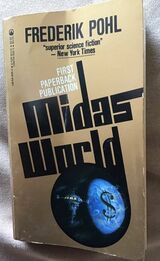|
Midas World by Frederik Pohl
An incredible book of robots. Each story presents a different perspective about a world where advanced robots and humans coexist due to the amazing technological advancement of cheap power. I checked this book out in the library, then bought it because it's a book written in 1983 that unexpectedly brings to mind current concerns of A.I. and automation taking human jobs. Each story is different and a progression of what happens as robots became the dominant population. Initially, I checked out the book for the last story "The New Neighbors" which twists the reader's expected point of view. I began reading and thinking it was about a retired Chicago man named Ralph with a dog named Cissie. Then I realized it's a retired robot named Ralph, living in the Towers, a high rise building, who lives amongst other robots. When a human couple, the Albrights moves in, Ralph chats with the wife and eventually is invited to their apartment for lunch. The differences between humans and robots are detailed, as Ralph describes to the Albrights his interchangeable accessories in which he can add a liquid and solid digestion system, thereby partake in coffee and food at times. Or he can add an enhanced communication faculties when necessary. He equates his abilities to add accessories much like humans might choose to take an umbrella or camera with them depending on the situation. It's a shifting of perspective when reading this story, since the reader is in the head of the robot and not a human. Consequently, we have an insider's perspective to the robot prejudices against humans and the underhanded tactics the robot residents employ to run out these new human residents. After that story, I had to read the entire book to see what other intriguing details would emerge about a robots way of life and human problems in a robot world. Those irreplaceable human jobs, such as white collar positions of doctors and politicians, easily replaced by robots. The ability of robots to simply change a program and part, meant they could have new languages and skills instantly, with none of the human learning curve. Two other stories in this book, "The Servant of the People" and "The Farmer on the Dole" suggested that humans and robots would both experience job elimination. In the "The Servant of the People" the human politician, who once fought for robot rights, now finds himself competing against a robot who can easily re-program itself/himself to fit the audiences, which is becoming more of a robot constituency. In "The Farmer on the Dole" we are introduced to a robot who is experiencing obsolescences as the farm jobs are dwindling so it/he undergoes some adaptations and moves to the city. In the urban areas, there are too many robots and not enough jobs, even with the adaptations, updates, the robots appear to live a homeless, purposeless existence, even with the odd job creations for robots, such as working as a thief. Although, I was more interested in the robot evolution, the theme of human de-evolution is bizarre and entertaining in some ways, as mandatory shopping and playing are required, which eventually leads to furry bear dress-up therapy for one human. What an imagination Pohl had. Midas World |
Blog AuthorTiff Graham (TiGra) experimenting with ideas Archives
December 2023
|

